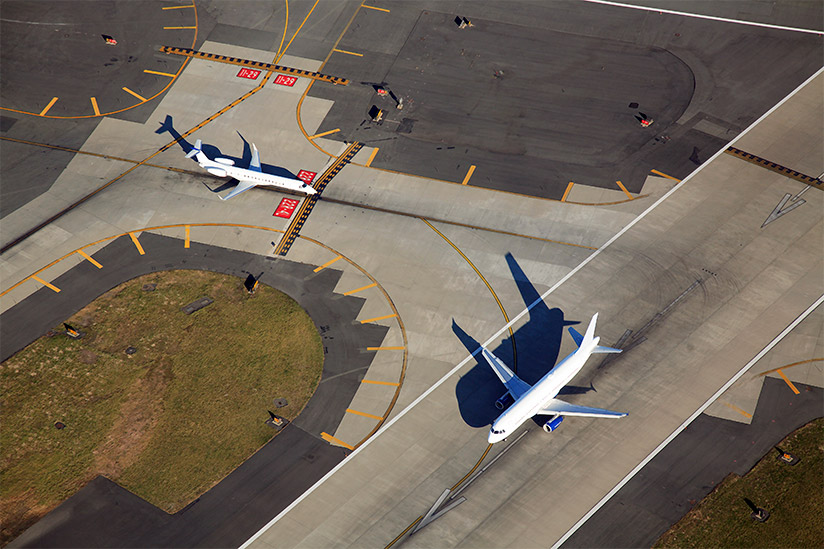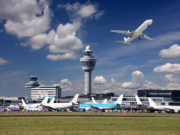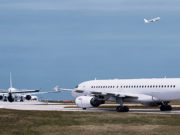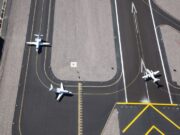
The COVID-19 pandemic affected nearly every sector of the aviation industry in member states of the European Union Aviation Safety Agency (EASA) in 2020, with the number of fatal accidents and fatalities near the annual minimum recorded during the previous decade, EASA says.
In its Annual Safety Review 2021, released earlier in August, EASA said that commercial air transport (CAT) airlines and non-commercial complex (NCC) business airplanes recorded no fatal accidents in 2020. From 2010 through 2019, CAT airlines recorded between zero and two fatal accidents a year, with associated fatalities ranging from zero to 150, the safety review said. Data showed that NCC business operations recorded no more than one fatal accident in each of the 10 previous years, with associated fatalities never higher than four.
CAT helicopters were involved in one fatal crash in 2020, compared with the previous decade’s range of one through five fatal accidents per year. Overall, helicopters were involved in four fatal crashes in 2020, compared with the decade’s range of six through 17 per year, the review said.
Balloons were an exception, with three fatal accidents in 2020 – equal to the greatest number of fatal accidents in any of the 10 previous years. Data showed three associated fatalities, compared with the decade’s range of zero through 10 fatalities per year.
Data showed that in 2020, there were no fatal accidents on the ground in an EASA member state, compared with the decade’s range of zero to three per year, and one fatal accident in EASA airspace, compared with the range of zero to two per year.
In the foreword to the safety review, EASA Executive Director Patrick Ky described this edition of the annual document as unusual because of the effects of the pandemic on the aviation industry, including a decline in air traffic levels of about 55 percent in 2020.
“The normal annual process of safety performance monitoring compared the review year’s safety figures against those of the previous five to 10 years,” Ky said. “Due to the unique situation in 2020, it is much more difficult to make a review and draw definitive conclusions about the safety performance of the European aviation system. Some trends will have to be monitored over the next few years as the impact and recovery from the pandemic become clear.”
FAA Proposes Big Fines for Unruly Passengers
Passengers accused of behaving badly on U.S. airlines so far in 2021 face a total of more than $1 million in proposed civil penalties, according to the U.S. Federal Aviation Administration (FAA), which levied the charges and proposed the penalties.
Between Jan. 1 and Aug. 19, about 3,889 reports were filed with the FAA of unruly behavior by passengers, the agency said, adding that of that number, 2,867 reports involved passengers who refused to comply with the federal requirement to wear a facemask. In addition, many cases have involved alcohol consumption, and the FAA asked airports in early August to prevent passengers from carrying “to-go” containers of alcohol aboard their aircraft.
The $1 million in proposed civil penalties includes $531,545 in penalties that were proposed Aug. 19 as part of the FAA’s Zero Tolerance campaign against unruly passengers, the agency said.
The FAA noted that it lacks the authority to criminally prosecute anyone and that it has asked airports to work more closely with local law enforcement officers to prosecute “egregious cases” of passenger misbehavior.
The largest single proposed penalty among the 34 cases announced Aug. 19 was $45,000 against a passenger on a May 24, 2021, jetBlue Airways flight from New York to Orlando, Florida. The FAA said the passenger was “allegedly throwing objects, including his carry-on luggage, at other passengers; refusing to stay seated; lying on the floor in the aisle, refusing to get up and then grabbing a flight attendant by the ankles and putting his head up her skirt.” Crewmembers placed the passenger in flexi-cuffs, and the flight crew made an emergency landing in Richmond, Virginia.
In another case, the FAA proposed a $42,000 civil penalty against a passenger on a May 16 jetBlue Airways flight from New York to San Francisco who allegedly refused to don a facemask and then interfered with crewmembers. The passenger was specifically accused of “making nonconsensual physical contact with another passenger; throwing a playing card at a passenger and threatening him with physical harm; making stabbing gestures towards certain passengers; and snorting what appeared to be cocaine from a plastic bag, which the cabin crew confiscated.”
The FAA said the passenger “became increasingly agitated, and the crew equipped themselves with flex cuffs and ice mallets to ensure the safety of the flight if his behavior worsened.”
The flight crew diverted the airplane to Minneapolis, Minnesota, where law enforcement personnel removed the passenger from the flight, the FAA said,
Other proposed penalties ranged from $32,500 down to $7,500 for passengers accused of refusing to don a facemask, threatening to kill others on the airplane, using obscenities in conversations with crewmembers, vaping in the cabin and other actions.
Federal law prohibits interfering with crewmembers or physically assaulting or threatening to assault crewmembers or passengers, and passengers who violate the law may face penalties for threatening the safety of the flight by disrupting or distracting cabin crewmembers from their safety duties.
The passengers involved in the 34 cases have 30 days to respond to the FAA after receiving the agency’s enforcement letter.
FAA Accuses 5 Companies of Flying Illegal Charters
Five companies face a total of $1.2 million in civil penalties for allegedly conducting illegal charter flights, the U.S. Federal Aviation Administration (FAA) says.
Each of the five has been communicating with the FAA about its case, the agency said in early August.
The agency proposed the largest penalty – $344,672 – against PottCo Airlease of Council Bluffs, Iowa, which it accused of conducting 16 paid passenger-carrying flights in 2019 in a Cessna Conquest without an operating certificate and without an air carrier certificate. The FAA’s other allegations include that the company lacked several required personnel and that it employed pilots who had not passed required written and oral tests or completed competency and proficiency checks, the FAA said.
The FAA levied similar allegations against three other companies, including PottCo Tactical Air of Council Bluffs, which faces a proposed civil penalty of $301,676; Wikert Air of Omaha, Nebraska, which faces a proposed $233,133 civil penalty; and Oracle Aviation of Omaha, with a proposed $191,536 civil penalty.
A fifth company, East Shore Aviation of North Charleston, South Carolina, faces a proposed civil penalty of $157,654 and is accused of conducting nine passenger-carrying flights in three Pilatus PC-12s, two of which were not on the company’s FAA-issued operations specifications and the third of which was flown under instrument flight rules even though it was to be used only under visual flight rules. The FAA also said that the company operated under an aircraft interchange agreement, which can be applied only to large multiengine jets, not to single-engine PC-12s, and that the pilots of the nine flights had not completed required training and passed required annual, written, oral and competency checks.
Image: © Veni | iStockphoto


